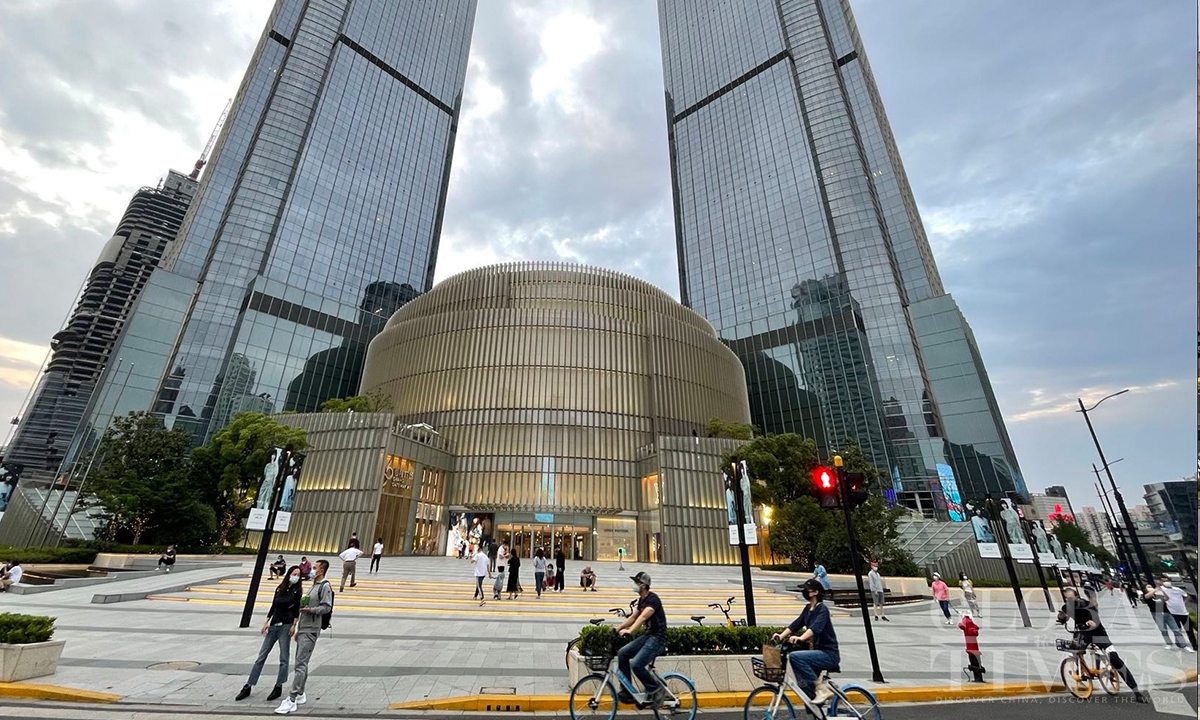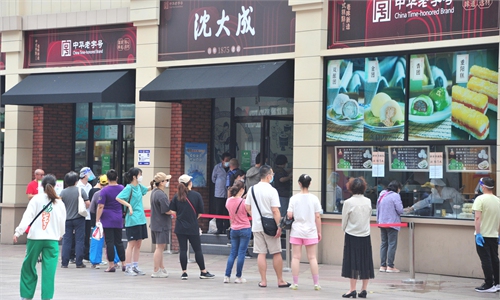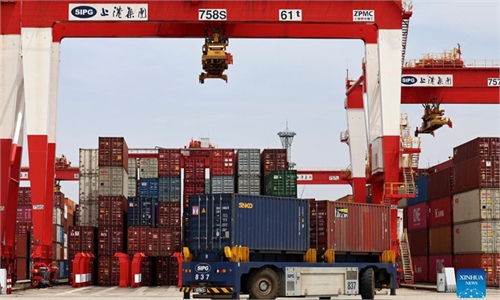
Shoppers visit Grand Gateway Plaza, a shopping mall in downtown Shanghai on May 30.Photo: Feng Yu/GT
Shanghai Vice Mayor Zong Ming announced on Tuesday that the megacity will fully resume normal production and daily operations starting from Wednesday. The city's 25 million residents, with an earnest heart, are preparing to embrace a new start after two months of lockdown.
The Global Times talked to residents in Shanghai on Tuesday, and most of them couldn't contain their excitement and expressed sincere hopes to return to their normal lives as soon as possible.
But some also expressed concerns over a possible epidemic resurgence, as well as anxiety about returning to normal social activities.
Some residents of Huangpu, Minhang, Xuhui, Yangpu and the Pudong New Area told the Global Times that they had received notices that they will be allowed to leave their residential communities freely from Wednesday under epidemic preventive measures, including scanning their venue codes before entering the communities.
"Seeing children running on the grass and hearing the city's noise, I feel that life is back," said a resident surnamed Pan in Minhang district. As a pregnant woman, she recalled that when she went out for a pregnancy test in April, "it was too quiet, only a few working staff were seen on the street."
"I want to take my family to a restaurant after the lockdown is lifted," a local resident surnamed Xie said. "The past two months were the longest time I spent at home in years."
Although there were many difficulties during the epidemic, "I also felt the warmth of mutual help in traditional Chinese culture and neighbors' kindness," Xie said, noting that she received all kinds of food from her neighbors. "It is said that adversity proves truth. This epidemic has shown us the warmth and friendliness of human relations."
A 41-year-old resident of Huangpu district who preferred to remain anonymous said that she has cleaned her home to welcome her husband, who is returning home on Wednesday. Her husband has been working under closed-loop management for over two months. "I have cooked chicken soup to welcome him and I also prepared wine to celebrate," she smiled.
However, some still showed anxiety. "I'm a little nervous to go back to work. I'm afraid there may be a resurgence again," a resident surnamed Gao told the Global Times. "My feelings are complicated."
Shanghai carried out a staggered lockdown starting on March 28 in Pudong and Puxi in turn. But many problems emerged, such as problematic food supplies, that triggered residents' discontent.
A recording of a phone call went viral in which a desperate elderly man asked the community committee for help because he had run out of medicine and food. Some residents also reflected that they had difficulties in seeing doctors in times of emergency.
Shanghai authorities, instead of lying flat in the face of the rampaging epidemic, did not give up on the city's residents. They were able to solve these problems step by step, for example, by helping transfer the elderly man to a hospital for treatment and improving the medical emergency system.
"A society is not afraid of flaws, but the ability to correct errors matters. Chinese society has the ability to correct errors, an important symbol reflecting our system's advantages," Zeng Guang, former chief epidemiologist of China's Centers for Disease Control and Prevention, told the Global Times.
"I'm glad that our society has the ability to detect and solve problems in a rapid manner," said Zeng. "We can't judge a society negatively only because individual problems occurred in fighting against Omicron, which is a new thing, and we should remain optimistic," he noted.
Yin Xin, spokesperson of the Shanghai municipal government, said on Tuesday that the city will make a new start on Wednesday, and residents all have looked forward to the day for a long time.
"Each resident in the megacity, with more than 25 million people, will have their own assessment of this period of time," said a 40-year-old white-collar worker surnamed Wang, who has been working as a volunteer in his residential community for two months.
Wang said he used the time to think, and to communicate with friends and family, and realized that he was among the lucky ones.
"Maybe I should thank life for such an experience. It gives me a chance to change my mind and have a new perspective on the world, to make me become a better person," Wang said.



